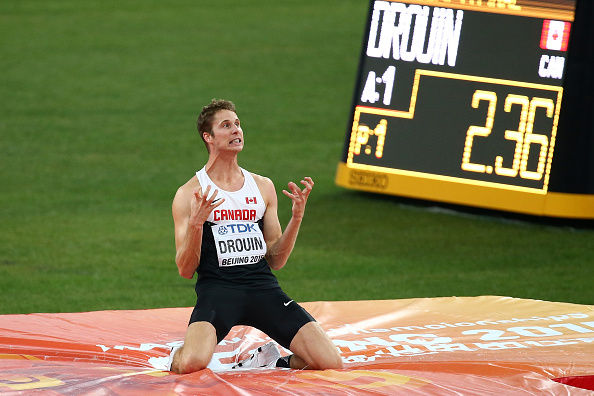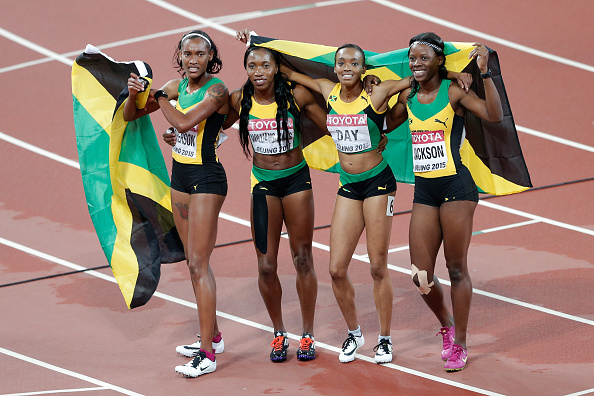BEIJING — With images of Jesse Owens and Luz Long on the big screens, Owens’ grand-daughter kicked off the final night of the 2015 track and field championships by presenting Usain Bolt his gold medal from the men’s 4x100 relay the night before.
This was, in a nutshell, the past and present of the sport. The future?
This, probably more than anything, from Seb Coe, the newly elected president of the IAAF, the sport’s governing body, taking over from Lamine Diack of Senegal, who served for 16 years: “We are more than a discussion of test tubes, blood and urine.”
He also said at a Sunday news conference, “We have a sport that is adorned by some of the most super-human outrageously talented people in any sport. Our challenge is to make sure the public know there are other athletes,” not just Bolt, “in our sport.”
This is not — not for a second — to discount the import of doping in track and field. But it’s clear things are changing.
The men’s 100 is often thought to be the dirtiest race in the sport; not so; a read of the historical record shows that, without question, it’s the women’s 1500.
And now that times in that event are often back at 4 minutes and over — the final Tuesday saw a slow, tactical 1500, won by one of the sport’s breakout stars, Genzebe Dibaba of Ethiopia, in 4:08 — more women from more countries can claim a legitimate shot at a medal.
That, actually, is one of the two big take-aways from these 2015 worlds: more athletes from more countries winning medals.
And, despite a disappointing medal performance by the U.S. team, the other: the emerging political influence internationally, concurrent with Coe’s presidency, of USA Track & Field.
Despite the chronic backbiting within certain circles — sometimes, track and field comes off as the only major sport in the world in which its most passionate adherents seemingly find joy by being so self-destructive — the sport could well be poised for a new era in the United States.
That depends, of course, on a great many factors. But everything is lined up.
Next year’s Rio Games are in a favorable time zone.
USATF has, in the last three years, under the direction of chief executive Max Siegel, made significant revenue leaps.
Beyond that, Eugene, Oregon, last year played host to the World Juniors and a meeting of the IAAF’s ruling council; the 2016 world indoors will be staged in Portland, Oregon; the 2021 world championships back in Eugene.
The 2017 track championships will be in London; in 2019, in Doha, Qatar.
By comparison: the swim world championships have never been held in the United States. This summer’s FINA championships were held in Kazan, Russia; in 2017, the swim worlds will be in Budapest; in 2019, in Gwangju, South Korea.
In elections that preceded this Beijing meet, all five of USATF’s candidates for IAAF office won; USATF president Stephanie Hightower got the highest number of votes, 163, for any candidate running for the IAAF council.
“You’ve got Seb leading the way but the change in the USATF position internationally is extremely significant,” Jill Geer, the USATF spokeswoman, observed Sunday night.
She also said, “Our development has to continue, and we don’t take our status as the world’s No. 1 track and field team for granted, at all,” adding, “No medals are guaranteed.”
From 2013 going back to 2004, the U.S. has been a 25-medal average team at world majors, meaning the Olympics or worlds.
Here, 18 overall, six gold.
Kenya and Jamaica -- with a victory late Sunday in the women's 4x4 relay -- topped the gold count, with seven. Kenya, overall: 16. Jamaica, overall: 12.
The upshot: for the first time at a world championships, dating to 1983, the U.S. finished third or worse in the gold-medal standings.
The last worlds at which the Americans won so few medals: Edmonton 2001, 13 overall, five gold; Athens 1997, 17 overall, six gold.
Here, the Chinese showed they are an emerging track and field threat, with nine medals, seven of them silver.
Ethiopia, Poland, Canada and Germany won eight apiece. Canada won two golds, in men’s pole vault, Shawn Barber, and on Sunday in men’s high jump, Derek Drouin, with a jump of 2.34 meters, or 7 feet, 8 inches.
Some specific examples of how the world is changing in real time:
The women’s 100 hurdles, long the domain of the Americans (and, recently, Australia’s Sally Pearson, who was hurt and did not compete here)?
Your Beijing podium -- Jamaica, Germany, Belarus.
The women’s 200? Gold went to Dafne Schippers of the Netherlands in a time, 21.63, surpassed in history only by the Americans Florence Griffith-Joyner and Marion Jones.
Asked the inevitable question, Schippers said, I’m clean.
Allyson Felix, the U.S. 200 star, didn’t challenge Schippers in that race; instead, Felix ran the 400, cruising to gold Thursday in 49.26, the year’s fastest time. Coe said the conversation ought to begin in earnest now about the possibility of allowing Felix the chance — like Michael Johnson in Atlanta in 1996 — to double in the 200 and 400 next year in Rio.
Without question, Bolt remains the dominant figure in track and field, and has been since his breakout performance here at the Bird’s Nest seven summers ago. Indeed, Coe said no single figure in international sport had captured the public imagination like Bolt since, probably, Muhammad Ali.
Assuming Bolt can keep himself in the good health he showed here, the world gets at least one more run-through of The Bolt Show, next summer in Rio, now with a worthy rival, the American Justin Gatlin, who took silver in both the 100 and 200. After that? Bolt’s sponsors want him to keep going through the London 2017 world championships; Bolt said he will have to think about it.
That relay Saturday night capped yet another incredible performance for Bolt. But for his false start at the Daegu 2011 worlds, he has won everything at a worlds or Olympics since 2008 — 100, 200, 4x1.
That was a familiar storyline.
This, too:
Mo Farah, the British distance star, nailed the triple double — winning the 5 and 10k, just as he had done at the Moscow 2013 worlds and the London 2012 Olympics.
The American Ashton Eaton won the decathlon, setting a new world record, 9045 points. He and his wife, the Canadian Brianne Theisen-Eaton, make up the reigning First Couple of the sport; she won silver in the heptathlon.
Dibaba, after winning the 1500 on Tuesday, took bronze in the 5000 Sunday night, a 1-2-3 Ethiopian sweep. Almaz Ayana broke away with about three laps to go, building a 15-second lead at the bell lap and cutting more than 12 seconds off the world championships record, finishing in 14:26.83.
Senbere Teferi outleaned Dibaba at the line. She finished in 14:44.07, Dibaba seven-hundredths behind that.
For junkies: Ayana covered the last 3000 meters in Sunday’s final quicker than any woman has run 3000 meters in 22 years.
Dibaba’s sister, Tirunesh, had held the world championship record, 14:38.59, set in Helsinki in 2005. Tirunesh Dibaba holds the world record still, 14:11.15, set in Oslo in 2008.
Then, of course, Beijing 2015 saw this all-too-familiar tale:
The U.S. men screwed up the 4x1 relay, a botched third exchange Saturday night from Tyson Gay to Mike Rodgers leading to disqualification after crossing the finish line second, behind Bolt and the Jamaicans.
Going back to 2001, the U.S. men’s 4x1 has failed — falls, collisions, botched handoffs — at nine of 15 major meets. Not good.
Job one is to get the stick around. If the Americans do that, they are almost guaranteed a medal — and, given a strategy that now sees Gatlin running a huge second leg, the real possibility of winning gold, as the U.S. team did in May at the World Relays, with Ryan Bailey anchoring.
Bailey did not qualify for these championships.
It’s not that the U.S. men — and women — didn’t practice. Indeed, all involved, under the direction of relay coach Dennis Mitchell, thought things were lined-up just right after the prelim, in which the same four guys — Treyvon Bromell, Gatlin, Gay, Rodgers — executed just fine.
The plan, practiced and practiced: hand-offs at about 10 to 12 meters in the zone in the prelims, 12 to 14 in the final. The plan, further: 28 steps in the final, 26 in the prelim — the extras accounting for the faster runs in the final, adrenaline and other factors.
Rodgers took responsibility for the essential mistake. He broke too early.
I don't make to many mistakes and I never make excuses I'll take the blame for this one, Ima learn from it and move on!
— Mike Rodgers (@Mr_Rodgers_DAT) August 29, 2015
As Jill Geer, the USA Track & Field spokeswoman put it in an interview Sunday night with several reporters, “In the relays, there’s a lot of pressure. everybody feels it,” athletes, coaches, staff.
She added, “They don’t accept a DQ any easier than the public does.”
Geer also noted, appropriately, that medals at this level are a function of three things: preparation, execution and luck, good or bad.
In the women’s 1500 on Tuesday, American Jenny Simpson — the Daegu 2011 gold medalist, the Moscow 2013 runner-up — lost a shoe. She finished 11th, eight-plus seconds behind Genzebe Dibaba.
Men’s decathlon: Trey Hardee — the Berlin 2009 and Daegu 2011 champion — got hurt halfway through the 10-event endurance test. He had to pull out.
Women’s 100 hurdles: 2008 Beijing gold and 2012 London silver medalist Dawn Harper-Nelson crashed out; Kendra Harrison was DQ’d; and the 2013 world champion, Brianna Rollins, finished fourth.
Women’s 4x4 relay: the Americans sent out a star-studded lineup, 2012 Olympic 400 champ Sanya Richards-Ross, Natasha Hastings, Felix and Francena McCorory, who had run the year’s fastest pre-Beijing time, 49.83.
Before the race, the four Americans went all Charlie's Angels.
Felix, running that third leg, then put the Americans in front with a 47.7-second split. But McCorory, windmilling with 90 meters to go, could not hold off Novlene Williams-Mills, and Jamaica won in a 2015-best 3:13.13. The Americans: 3:19.44.
It was the first Jamaican 4x4 relay worlds gold since 2001. The Jamaicans have never won the relay at the Olympics.
In the men’s 4x4, LaShawn Merritt reliably turned in a winning anchor leg to lead the U.S. to victory in 2:57.82.
Trinidad and Tobago got second, a national-record 2:58.2. The British, just as in the women’s 4x4, took third. The British men: 2:58.51; the British women, a season-best 3:23.62.
Earlier Sunday night, Kenyan men went 1-2 in the men’s 1500, Asbel Kiprop winning in 3:34.4, Elijah Manangoi 23-hundredths back.
The U.S. got three guys into the final, including 2012 Olympic silver medalist Leo Manzano and Matthew Centrowitz, second in the 1500 at the Moscow 2013 worlds, third at Daegu 2011.
The American finish: 8-10-11, Centrowitz, Manzano, Robby Andrews.
Manzano said afterward, “The first 800 was fine, but I thought I was just going to gear up like I did two days ago,” in the prelims, riding his trademark kick. “Unfortunately it didn’t quite pan out like that. Sometimes it just clicks in place, and today didn’t quite fit in there.”
A couple hours before that men’s 1500, Geer had said, “We had an awful lot of 4-5-6-7 finishes,” adding that “those are the kind of finishes where we will be drilling in and saying, how do we turn that 4-5-6 into a 1-2-3?”
The men’s 5k on Saturday, for instance: 5-6-7, Galen Rupp, Ben True, Ryan Hill.
Beating Farah? That’s an audacious goal.
But, Geer insisted, there is “nothing systemically wrong” with the U.S. effort.
“Our performance wasn’t necessary all the medals we had planned for or hoped for,” she said.
At the same time, she asserted, “When you look at our performance here, where we did well and maybe didn’t do well, if we can fix, which we absolutely can, even half the areas we had execution mistakes or under-performed, we will be extraordinarily strong in Rio.”












